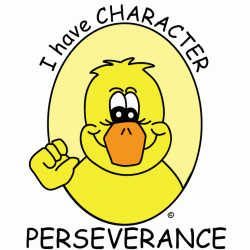
When a martial arts school talks about perseverance you might think that it would be about doing push ups without stopping or some other kind of physical activity. While learning not to quit, even if you get tired, is one way of learning about perseverance and reaching goals, developing perseverance in ourselves and our children is one of the factors that will determine future success.
The ability to stick to our goals until they are reached along with the effort and hard work required, has more to do with accomplishments than does getting into a prestigious university. Children do not learn this all by themselves. As parents we have a great influence on what our children will value, whether it will be effort and hard work or in getting the perfect grade or winning.
Think about what the effects on ourselves or our children if we were not afraid of making a mistake, and saw that if we stuck with something that we could make a success of our efforts and reach our goals. Unfortunately too many parents only ask the questions about ‘what is the grade you got’, ‘did you win’? Imagine if the effort and perseverance a child or ourselves put into a project or goal was just as important to us as the end product of what grade or score we ended up with?
During this month we will discuss what it means to keep going and not quit, when is it reasonable to allow a child to quit an activity, what gets in the way of persevering, what keeps us going and what the benefits are of not giving up. This month is not going to be just about not quitting on our push ups and sit ups, it will be about setting goals for ourselves and finding a way to reach them – even if it takes more effort than we thought.

I hope we can connect this lesson of perseverance to academic work for success, also. Reminds me of the chapter from the Malcolm Gladwell book, Outliers, where American students ranked medium-low on math skills on an international scale, which correlated scores to persistence (amount of time willing to be spent solving a problem without giving up). Other cultures students had much longer times working on the problems. I see many students who seem to work hard and persevere in sports without that same effort in the classroom. And when you are 25 and the sports leagues are over, the ones I know are floundering without a career path.
Thank you for your comment. You will see we talked to the students on Thursday about the need to show perseverance and put in the effort on their school work as well as the physical / fun activities. In addition, take a look at the newer post here. On Monday the post is on what parents can do to cultivate perseverance in their children.
I feel like teaching/instilling perseverance is harder than ever because so much of the culture today involves praising children for any little thing they do. It is now viewed as a bad thing to let their feelings get hurt; so much is done to avoid this. How about the end of the season sports trophies? Most parents, if they are honest, want to roll their eyes about them being handed out for simply showing up. Everyone gets one now. “Back in the day” you had to compete and win to get one. It really meant something; it involved losing and winning and pushing yourself. That is not the case now. We are so afraid of hurting their self esteem that we don’t let them stumble. This is going to be a problem down the road for them ( I am speaking as a collective whole). If you don’t stumble, you don’t learn to hang in there and persevere.
“Tiger Mom” Amy Chua got a lot of flack for her views… but I think she has the parenting thing right in many respects.
The pendulum swings in both directions and neither extreme is good for the parent or the child. In an upcoming post I am listing 5 ways parents can affect their child’s ability to use their inner drive and see the benefits of effort and perseverance.